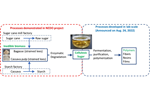Bizente project evaluates enzymatic recycling for resins, composites
Among the latest advances are toxicity tests, used to evaluate the effect of different resins and plastic degrading on aquatic and terrestrial organisms, and thus determine the technology’s long-term sustainability.
Earthworm tests undergone in the Bizente project. Photo Credit: Aitipp Technology Centre
The EU project , coordinated by the (Zaragoza, Spain), is facing its last months of work. The 3-year research, aided by an international consortium made up of a dozen partners, has announced the development of an enzymatic technology for recycling thermoset composites, to give them a second life. Through protein engineering, Bizente has successfully molecularly modified enzymes and resins, making them suitable for controlled biodegradation in a bioreactor. Sectors such as aviation and construction could benefit.
Among the latest advances are the toxicity tests being carried out by a group of scientists from the University of Cadiz (Spain), in collaboration with the rest of the project consortium, with the aim of evaluating the effect of different resins and plastic degrading products developed within the framework of the project on aquatic and terrestrial organisms, such as earthworms. The laboratory is studying these invertebrates as model organisms of great importance in the terrestrial ecosystem and as indicators of soil health. They are also beginning to work with artemia (brine shrimp), as they are considered the base of the trophic chain in aquatic systems.
In this way, the environments in which these materials could biodegrade are being recreated, and their degree of toxicity measured, taking into account possible anomalies in the different organisms. In the case of the worms, the observation examines whether external alterations occur, such as changes in weight, swelling, lesions, spasms, coiling, attempts to escape, lethargy and a host of strange behaviors, in addition to whether mortality is reached. Moreover, with the analysis of enzyme activity biomarkers, which serve as early warning systems, possible adverse effects (neurotoxicity and oxidative stress) in organisms are analyzed. The results obtained are encouraging, since the resins and enzymatic products studied have not caused any alteration in earthworms under realistic environmental conditions.
During these months, protocols have also been established to detect and analyze the “hot spots” of the chemical and enzymatic degradation products and processes of the resins studied in Bizente, in order to find new alternatives and thus minimize their potential environmental impact in the future. Like other tasks, this work is being carried out collaboratively among the consortium partners, providing the necessary information to address the next stages of the research.
The Bizente project is backed by €3.18 million, €2.5 million of which has been contributed by the European Commission.
Related Content
-
JEC World 2024 highlights: Glass fiber recycling, biocomposites and more
CW technical editor Hannah Mason discusses trends seen at this year’s JEC World trade show, including sustainability-focused technologies and commitments, the Paris Olympics amongst other topics.
-
Partners recycle A350 composite production waste into adjustable-length rods for MFFD
Herone, Spiral RTC, Teijin Carbon Europe and Collins Aerospace Almere recycle A350 thermoplastic composite clips/cleats waste into rods for the all-thermoplastic composite Multifunctional Fuselage Demonstrator’s crown.
-
Trends fueling the composites recycling movement
Various recycling methods are being considered for composites, from novel dismantling and processing, to building capacity and demonstrating secondary use applications.






